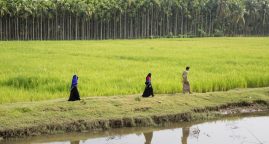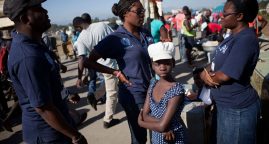Not Without Dignity: Views of Syrian Refugees in Lebanon on Displacement, Conditions of Return, and Coexistence
Article published on ictj website on 06/09/2017 by Rim El Gantri and Karim El Mufti
Discussions about a future return of refugees and coexistence among groups currently at war in Syria must begin now, even in the face of ongoing violence and displacement. This report, based on interviews with refugees, makes it clear that the restoration of dignity will be important to creating the necessary conditions for return and peaceful coexistence — and building a stable post-war Syria one day.
Armed conflict in Syria has displaced millions of people inside and outside of the country. When a political settlement to the conflict is eventually reached, the process of refugees returning to Syria and rebuilding their lives, relationships, and communities will be long and complex. However, discussions with displaced persons about return and coexistence can begin now, even in the face of ongoing violence and displacement.
This research report is based on interviews with refugees living in Lebanon and representatives of local and international organizations in both Lebanon and Turkey working on issues related to Syrian displacement. The report provides an important window into the experiences of refugees in Lebanon as well as their concerns, expectations, and priorities regarding conditions of return and coexistence.
The research findings highlight the harms experienced by Syrian refugees at both the individual and collective levels, including the loss of loved ones, houses, property, and businesses in Syria and difficult economic situations and discrimination in Lebanon. Displacement has had devastating impacts on families and led to broad social fragmentation, including sectarian and political divisions and rifts between those who left Syria and those who remained. The effects of conflict and displacement will be generational, as refugee children have been traumatized by their exposure to violence and largely deprived of education.
The findings also capture common priorities among Syrian refugees in Lebanon for return. Most do want to return, not just to Syria but to the regions and communities where they previously lived. Common preconditions for return include safety and security; shelter, livelihoods, and the physical reconstruction of homes and infrastructure; compensation or restitution for the loss of property and housing; the provision of education for children and youth; psychosocial support; and family reunification.
One positive development among refugees in Lebanon is that many youth engaged with local and international civil society organizations have acquired new skills and an openness to people with different religious and political beliefs that one day may contribute to rebuilding relationships in Syria.
Views about the potential for coexistence and justice vary widely. Some refugees believe that Syrians will be ready to rebuild ties once the conflict ends, while others are less optimistic. Some believe that justice is necessary for return, while others think it unlikely to occur. The research makes it clear that the restoration of dignity will play an important role in establishing the necessary conditions for refugee return and coexistence.
While return will ultimately depend on a political resolution to the Syrian conflict, several steps can be taken now that are likely to have implications for return and coexistence in the future. These include:
Integrate the views of refugees into discussions and policies about conditions of return, as participatory processes are more likely to lead to context-specific interventions.
- Support community-level interventions, like the provision of psychosocial support, that can be implemented now and may facilitate return and coexistence in the future.
- Address sexual and gender-based violence, women’s exploitation, and child marriage by empowering women, educating young girls, and raising awareness of such abuses among families.
- Provide educational support to minimize the risk of the next generation being characterized by missed schooling, trauma, and violence.
- Integrate property and land restitution into discussions of displacement settlement processes in the interest of future social cohesion.
- Promote interaction between different groups and communities to reduce and prevent further sectarian and political divisions.
- Support further research on Syrian refugee experiences and views on return and coexistence in countries such as Turkey and Jordan as well as in Europe.
Conclusion: Restoring Dignity, an Essential Step towards Coexistence
This study examines the experiences of Syrian refugees in Lebanon since their displacement started as well as their expectations and perspectives on issues of justice, coexistence, and return. The range of refugee profiles led to a variety of responses, depending on factors such as gender, age, political affiliation, religious faith, and social class. The study depicts the views of respondents on their past, present, and future, in light of the high levels of distress, exhaustion, and frustration they feel due to their displacement and their experiences in host communities of being seen as threats and nuisances. The responses revealed the reasons behind their displacement, including persecution and torture; the loss and enforced disappearance of loved ones; the loss of housing, land, and property; hostilities; and fear of kidnapping and being drafted by the army or forcibly recruited by armed groups.
At the same time, interviews revealed that most respondents planned to go back to Syria should sufficient conditions of return be ensured, acknowledging that this will require time and hard work, with no guarantee of success. The report highlights the impact of war and displacement on individuals, families, and the Syrian social fabric, which is now deeply fragmented, with dangers of sectarianism and its associated discord, incitements of hatred, and continued political violence.
Critically, a common word and concept appeared throughout the interviews, karama or “dignity.” From the richest to the poorest, from the most integrated to those trying to escape Lebanon’s harsh living conditions, dignity was identified as a common loss, beginning with the very fact of their displacement by a war that has changed their lives forever. Furthermore, the humiliation and discrimination faced by refugees impacted on people who had been used to a certain social and economic level in Syria, despite a quasi-absence of civic and political rights.
Dignity is a very important concept in the Arab world. Children are educated to preserve their dignity, to live in dignity, and to prioritize dignity in their decision making. The concept is well depicted in Arab literature and taught in schools as a key theme. Dignity is a pre-Islamic concept and has been praised by poets of the Jâhilîya, such as Antarah Ibn Shaddad, who wrote at length about dignity, self-esteem, and self-honor. As one of his verses goes:
Don’t offer me life elixir with humiliation.
Offer me rather a drink of colocynth with dignity (pride).
Dignity is also very present in Islamic culture. Indeed, the Qur’an and prophet of Islam mention pride, honor, and humility. Most Arabs have been educated on prophetic traditions stating that “the strong believer is better than the weak one” or “the upper hand is better than the lower one,” urging people to work to provide for their needs and preserve their dignity. The Qur’an also preserves the rights of the poor in different verses. For example, in “Sourat Al-Dhuha,” it forbids the humiliation of orphans, stating: “So, as for the orphan, do not oppress (him). And as for the petitioner, do not repel (him). But as for the favor of your Lord, report (it).” Islam, as do all religions, also encourages reconciliation and forgiveness. And many respondents made religious references in speaking about justice, forgiveness, and reconciliation. However, forgiveness has a stronger implication when the victim is in a position of power, because he or she is not being forced to forgive, making the act genuine and true.
In their responses, refugees mourned the loss of the dignity they used to enjoy in Syria through a form nostalgia that made some forget what had sparked the revolution. The atrocities of the war may have decreased their level of expectations for the future. Dignity would now come down to a tent on their homeland soil. Nevertheless, dignity could also allow a reconstruction of their relationship with the Syrian state via reforms that would lead state institutions to treat them as human beings. Dignity and the power to decide for oneself would, according to them, allow them to forgive those who were executing orders and to limit criminal prosecution to commanders. Dignity would also allow them to expect the divine justice they believe in.
Dignity is related to reversed gender roles. In fact, women are now often in what were traditionally men’s roles. Despite this, there is a sense of satisfaction among women regarding these new tasks. Many have learned new skills and aspire to create and establish their own businesses in order to consolidate this newly acquired autonomy. However, while men may to some extent appreciate the emergence of such roles, because they were raised to be the breadwinners and decision makers within families, they also feel their own roles have been undermined.
New roles have reached not only women but also youth, some of whom have acquired knowledge and skills to reinvest in their country in the future. They seek to bring into a future Syria elements of openness, tolerance, and the blossoming effects of a newly established Syrian civil society. They also have managed to prove themselves in a host society that denies their rights and fears their integration and long-term establishment, hence giving them a sense of dignity and self-esteem.
Syrians interviewed for this study consider Lebanon to be a counter-model of how to deal with the different aspects of the Syrian tragedy. Lebanon’s continuous “cold war” among religious sects and communities represents a nightmare for the distraught Syrian communities to whom sectarianism in its Lebanese sense would be devastating for the future of Syria. A deficient and imperfect political solution, such as Lebanon’s Ta’if Agreement, is also seen as an obstacle to peace and stability in the long run, and the neo-liberal economic approach encountered in Lebanon makes many Syrians afraid of losing their basic socioeconomic rights when the time comes for reconstruction.
While the framework for this study was not dignity but coexistence and reconciliation as envisioned by the beneficiaries of a possible future transitional justice process, the findings could not ignore this notion. Discussions confirmed the idea that transitional justice should be context driven. The Arab Spring has opened the door to new concepts and ideas related to the cultures and histories of the Middle East and North Africa. We are now facing a new generation of responses to the needs of a society through its own concepts and not the concepts that led previous processes elsewhere. The process that would rebuild social ties and lead to sustainable peace is wider than the individual coexistence or reconciliation between the victim and the perpetrator. It is above all about reconciling individuals with state institutions and other groups. As stated by a respondent, “we will return when we will be able to raise one flag above Syria, one state, one authority. Otherwise there can be no guarantee for safety.”
Related Articles
Refugees pay price when governments ignore asylum rules
10/05/2017. Some politicians cast aside humanity in favour of short-term political gains.
IOM, EU Strengthen Ties on Global Migration at Senior Officials Meeting
03/10/2017. “The EU and IOM share the view that no country can effectively address migration alone” William Lacy Swing
Majority of trafficking victims are women and girls
12/21/2016. According to a new report from the United Nations Office on Drugs and Crime (UNODC), the vast majority of all human trafficking victims – some 71 per cent – are women and girls and one third are children.





